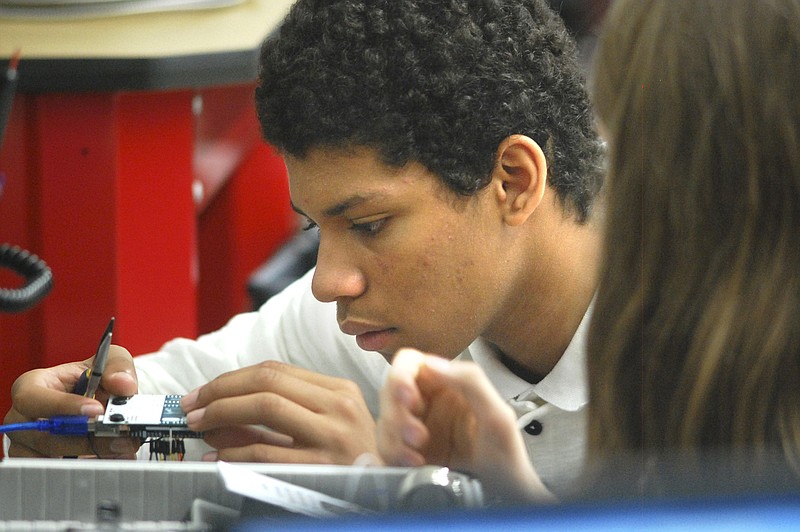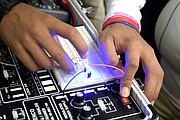Read more
Mechatronics program puts students on path to success
If Hamilton County would - or could - replicate in all other schools the hard work and creativity of an innovative and industry-supported class at Tyner Academy, hundreds more students not only would graduate high school here, but also would graduate with jobs. Real jobs. Good paying jobs.
Tyner's success story in mechatronics - the name of the three-year course combining mechanical engineering, computer science and electrical engineering that will lead to certification backed by Chattanooga automotive component manufacturer Gestamp - began with a teacher who wouldn't give up on his students.
Bryan Robinson knew most of the students who attend Tyner live in poverty, and only 1 percent of students who graduated in 2014 met all four college-ready benchmarks on college ACT test scores.
But after teaching auto mechanics at Tyner for just one year, he also realized just how bright and capable his students are. And he resolved himself to broadening their opportunities.
Robinson took it upon himself to get the training he would need to devise and teach a course in the programming and handling of the factory robots now increasingly used in manufacturing companies like Gestamp and Volkswagen's auto assembly plant here.
With backing and support from Gestamp and the school system, and after traveling to a number of training sessions, Robinson is now certified to teach students how to program the classroom's FANUC robot - a miniature version of the factory machines. Gestamp is loaning more than $30,000 in equipment, including a training robot, to the program.
This is not just a jazzed-up version of a robotics team or club. Mechatronics courses are real job-makers. Students who stay with the program for three years will leave with a certificate that can virtually guarantees them a job.
Robinson said Gestamp personnel told students, "If you have this certification and can train that robot, we will hire you."
Robinson has nine students enrolled this fall, and 25 more students will be added in the spring.
In the absence of county vocational-technical schools, mechatronics and a fistful of other programs like it are blazing a pathway from our local schools to careers - especially in schools like Tyner where too many students live in poverty and are unlikely to attend college.
David Cowan, director of career and technical education for Hamilton County Schools, says starting and expanding programs like this is one of the school district's goals, because it offers students a specific set of skills that allows them to immediately thrive in a highly competitive industry. For now the county has about 116 teachers in 24 work-geared programs across the county. So far, only a few of those programs, like office administration and nursing assistance, offer pathways to certificates.
Of the 4,500 or so students who take the elective work courses, Cowan said only about 3 or 4 percent receive certificates - usually because the students are still exploring and change their minds about possible careers. But he said educators are working to increase the number of course "concentrators."
Mechatronics, he says, ups the ante.
"We see the importance and how manufacturers want this," he said. "It is a prime example of how we can train our kids to be ready for the workforce, and once they get inside the industrial setting, the sky's the limit."
Tragically, Hamilton County some years ago essentially did away with vocational schools. The goal of graduating all children on a college track was admirable and well-intentioned - but completely unrealistic.
The unintended consequence was classrooms where children with different needs and interests fell behind and became distracted. Combined with zero tolerances for behavior deemed poor, far too many children - especially those from impoverished and at-risk homes - ended up suspended, expelled or as drop-outs. With no diploma and no skills, crime was often the only job available.
Hamilton County and local school leaders have flirted in a few election talks with reviving vocational-technical schools, but when election days passed, conversations turned instead to avoiding needed revenue increases - taxes.
If our leaders and our taxpayers are not going to take responsibility for helping our children have futures and ensuring our industries have local workers, then marriages of necessity between Gestamp and educators on fire are our best hope.
May we have many improvisations like Tyner's mechatronics program.
Tyner student Derek Ormond told the Times Free Press he would stay in Robinson's classroom all day working on the different robots and training equipment, if he could. He is one of the students that others ask for help, and he likes that.
"Working on robots in factories is what I want to do after high school," he said, plugging in a series of resistors to the analog trainer. "And here I am practicing."
That is what education success looks like.

